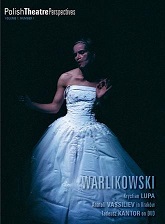Returning to the Garden of Childhood
Returning to the Garden of Childhood
Author(s): Béatrice Picon-Vallin, Krystian Lupa, Jean-Pierre ThibaudatSubject(s): Theatre, Dance, Performing Arts
Published by: Instytut im. Jerzego Grotowskiego
Keywords: Krystian Lupa; Polish theatre; directing; scenography; set and costume design; acting; Tadeusz Kantor; Konrad Swinarski; Jerzy Grotowski; Jerzy Jarocki; drama school; theatre pedagogy; Carl Jung; Jelenia Góra
Summary/Abstract: Since his debut as a professional director in 1976, Krystian Lupa has developed into perhaps the most influential theatre practitioner currently working in Poland, and a major figure of European theatre. Counting Tadeusz Kantor, Jerzy Jarocki, and Brecht’s close collaborator Konrad Swinarski among his teachers and formative influences, and prominent directors such as Anna Augustynowicz, Piotr Cieplak, Grzegorz Jarzyna, Maja Kleczewska, and Krzysztof Warlikowski among his former students, Lupa’s career spans several decades of innovations and developments in Polish theatre. However, while Lupa’s productions have been widely acclaimed throughout continental Europe, culminating in his award of the Europe Theatre Prize in 2009, his work as a director and scenographer is still relatively little-known among Anglophone theatre and research communities. This extended interview was conducted over three days by Jean-Pierre Thibaudat and Béatrice Picon-Vallin in December 2003, with the collaboration of Ewa Pawlikowska and Michel Lisowski, who assisted with translation. The text was initially compiled and edited from the audio recordings by Thibaudat, and was published in French in 2004. The version that appears here constitutes the first comprehensive introduction to Lupa’s work available in English, and includes additional annotations and information by the PTP editors. During the conversations, Thibaudat and Picon-Vallin posed questions to Lupa regarding various aspects of his work and his personal journey: his formative experiences and training, his impressions of the context in which he emerged as a young theatre practitioner, his approach to work with actors, text, and the theatre space, and his ongoing pedagogical practice as a tutor at the State Higher Theatre School (PWST) in Kraków. Lupa’s responses provide a particular insight into key elements of his theatre practice and teaching – notably his methods of working with actors through concepts such as the ‘landscape’, the ‘inner monologue’, and the ‘long discourse’ – and also into his perceptions of the work of his Polish directing predecessors: Grotowski, Kantor, and Swinarski.
Journal: Polish Theatre Perspectives (PTP)
- Issue Year: 2010
- Issue No: 1.1
- Page Range: 272-317
- Page Count: 46
- Language: English

